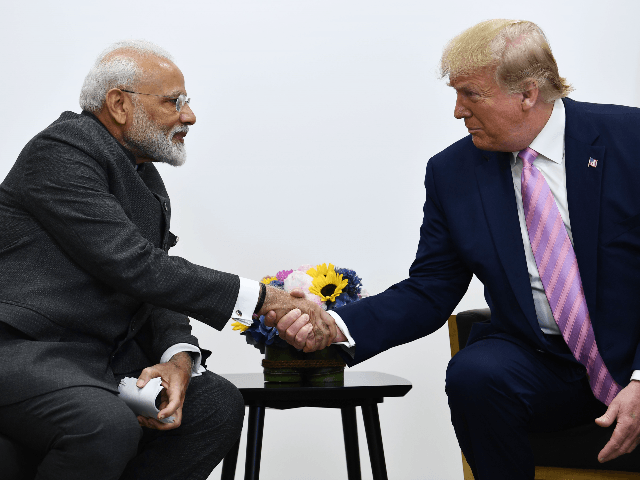Indian Prime Minister Narendra Modi talked with U.S. President Donald Trump on the sidelines of the G20 summit in Osaka, Japan, on Friday.
The two discussed trade issues, defense, the threat posed by Iran, and the most important tech issue of the day, the advance to 5G wireless networking.
Modi thanked Trump for expressing his “love towards India” in a letter, while Trump offered hearty congratulations to Modi for his recent election victory.
“I remember when you first took over, there were many factions and they were fighting with each other and now they get along. It’s a fantastic tribute to you and your abilities,” Trump told the Indian prime minister.
Trump was perhaps underselling the current level of animosity between Indian political factions, although the gains for Modi and his BJP party in the recent election were indeed impressive.
Trump seems to get along very well with Modi, who attended a trilateral meeting with the U.S. president and one of his other best friends on the international stage, Japanese Prime Minister Abe Shinzo. There are nevertheless some significant issues between the U.S. and India, prominently including India’s concerns about securing its energy supply with Iranian oil forced off the market by U.S. sanctions.
India has complied with Iran sanctions, ending its oil imports after a waiver granted in November expired in May, but has a different set of trade disputes with the United States, as summarized by the Economic Times of India:
India has raised tariffs on 28 items, including almond, pulses, and walnut, exported from the US in retaliation to America’s withdrawal of preferential access for Indian products.
The Trump administration wants Prime Minister Modi to lower the trade barriers and embrace “fair and reciprocal” trade.
Trump has also criticized India’s high import tariff on the iconic Harley Davidson motorcycles as “unacceptable” though acknowledging that his “good friend” Prime Minister Modi has reduced it from 100 percent to 50 percent.
[…]
America, in March last year, imposed 25 percent tariff on steel and a 10 percent import duty on aluminum products.
Observers at the G20 summit thought Trump was pleased with the outcome of his meeting with Modi and Abe, which Modi described as “productive.” Modi’s administration highlighted an agreement between the U.S., India, and Japan on the importance of an “open, stable, and rule-based Indo-Pacific region.”
Indian sources said Trump and Modi did not dig into the particulars of trade during their meeting but instead sought to “clear the air” so officials such as Treasury Secretary Steven Mnuchin and U.S. Trade Representative Robert Lighthizer, who were both present at the meeting, could hammer out the particulars with their Indian counterparts.
Indian Foreign Secretary Vijay Gokhale added that Modi told Trump he does not intend to withdraw tariff hikes that “already happened,” but wanted to “look forward and see how we can resolve these issues.”
On the topic of Iran, Gokhale said Modi reminded Trump that India was getting about 11 percent of its oil from Iran before U.S. sanctions went into effect, but was honoring the sanctions despite the considerable cost to India’s economy. Modi also said India is sending warships to protect its shipping in the Strait of Hormuz against Iranian sabotage, as Trump has asked other nations to do.
Modi’s position on the evolution to 5G wireless was one of the most interesting results of his meeting with Trump. Gokhale said Modi stressed the influence India will have on the 5G world, thanks to its immense market of smartphone users, and told Trump that India is ready to work with American companies.
“India and US will have to see how to leverage this, the billion Indian users, India’s capacity in technology development in start-up and design and Silicon Valley and its role in developing 5G technology,” Gokhale told the press.
“President Trump, in turn, welcomed this and his main idea was to say that the US has the capacity, it has the capability, it has the human resources, Silicon Valley is working on it, let me see how India and the US can work together in terms of business, not in terms of government, in terms of how business and industry can be put together,” the Indian foreign secretary added.
India Today noted that Modi has not committed to a boycott of technology from China’s Huawei corporation the way other close U.S. allies Japan and Australia have. The United States has warned allies that Huawei technology could be compromised by Chinese intelligence, making it difficult for the U.S. to participate in full intelligence-sharing with countries that install Huawei 5G networking equipment. A close partnership between Indian and American industry has the potential to produce a formidable competitor to Chinese technology on a brisk timeline.

COMMENTS
Please let us know if you're having issues with commenting.